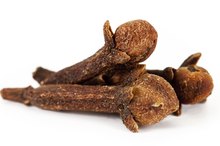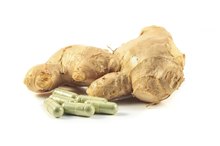What does fact checked mean?
At Healthfully, we strive to deliver objective content that is accurate and up-to-date. Our team periodically reviews articles in order to ensure content quality. The sources cited below consist of evidence from peer-reviewed journals, prominent medical organizations, academic associations, and government data.
The information contained on this site is for informational purposes only, and should not be used as a substitute for the advice of a professional health care provider. Please check with the appropriate physician regarding health questions and concerns. Although we strive to deliver accurate and up-to-date information, no guarantee to that effect is made.
Herbal Teas for Dizziness & Nausea
When you experience nausea and dizziness, you may run to the medicine cabinet and take a pill or tablet. However, there are more natural methods that may relieve the nausea and dizziness. Herbal tea is a prime example, especially teas made of peppermint, spearmint or ginger. Herbal teas are usually free of caffeine.
Types
Certain types of herbal teas are especially beneficial for upset stomachs and dizzy spells. Ginger tea, peppermint tea, and spearmint tea have been found to be some of the most effective. To make ginger tea, steep chopped ginger root pieces in water, steep ground ginger spice in water, or buy pre-packaged ginger tea. You can also make spearmint or peppermint tea with the mint plant, mint essential oil, or store-bought mint teas. Victoria Zak, in "20,000 Secrets of Tea," recommends a mixed tea of ginger and peppermint 1. She says its warming and cooling effects play off each other, while both types calm your nausea and dizziness.
- Certain types of herbal teas are especially beneficial for upset stomachs and dizzy spells.
- You can also make spearmint or peppermint tea with the mint plant, mint essential oil, or store-bought mint teas.
Effects
Can Drinking Ginger Tea Help With Anxiety?
Learn More
Ginger tea can be extremely effective for both dizziness and nausea. Ginger is known for relaxing the intestines 2. Zak says that ginger, peppermint and spearmint can all be beneficial for motion sickness, which has symptoms of both nausea and dizziness. Peppermint tea works because of its menthol content, which acts similarly to an anesthetic for the stomach. Spearmint has similar effects to peppermint, but is less strong and less expensive to grow.
- Ginger tea can be extremely effective for both dizziness and nausea.
- Peppermint tea works because of its menthol content, which acts similarly to an anesthetic for the stomach.
History
Herbal teas and plants have been used medicinally throughout history. MedlinePlus explains that mint plants, including peppermint and spearmint, have been used medicinally since ancient times in Rome, Egypt and Greece. Peppermint was often used throughout history for its benefits related to nausea and digestive health. Ginger also has a long history. Zak explains that it has been used medicinally for more than 2,000 years. The World's Healthiest Foods shows that ginger was found in historical writings from Eastern cultures, including China and India 2. Like the mint plants, it has been used historically for its digestive health properties and other health benefits.
- Herbal teas and plants have been used medicinally throughout history.
- MedlinePlus explains that mint plants, including peppermint and spearmint, have been used medicinally since ancient times in Rome, Egypt and Greece.
Expert Insight
The Side Effects of Magnolia Bark Extract
Learn More
Studies have been conducted on ginger to back up its long medicinal history. The World's Healthiest Foods shows research finding that ginger contains antioxidants and other healing properties 2. The World's Healthiest Foods also reports on double-blind studies where ginger was found to prevent motion sickness, which includes symptoms such as dizziness and nausea 2. One study compared ginger to over-the-counter and prescription motion sickness medicines, and found that ginger worked better.
Warning
MedlinePlus warns that many herbs are not controlled or researched to see how they interact with other drugs and supplements you may be taking. It recommends reading labels and discussing the herbs you want to take with your doctor. Specifically, Zak warns that ginger may worsen peptic ulcers. MedlinePlus warns that you could experience allergic reactions to peppermint or spearmint, and that too much of the menthol in them could cause negative effects, such as breathing difficulties and sores in the mouth. However, they say that small amounts are generally safe if you are not allergic. Consult with your doctor, to be safe.
- MedlinePlus warns that many herbs are not controlled or researched to see how they interact with other drugs and supplements you may be taking.
- MedlinePlus warns that you could experience allergic reactions to peppermint or spearmint, and that too much of the menthol in them could cause negative effects, such as breathing difficulties and sores in the mouth.
Related Articles
References
- "20,000 Secrets of Tea"; Victoria Zak; 1999.
- The World's Healthiest Foods: Ginger
- Ryan JL. Treatment of chemotherapy-induced nausea in cancer patients. Eur Oncol. 2010;6(2):14-16.
- Marx W, Ried K, McCarthy AL, et al. Ginger-mechanism of action in chemotherapy-induced nausea and vomiting: A review. Crit Rev Food Sci Nutr. 2017;57(1):141–146. doi:10.1080/10408398.2013.865590
- Panahi Y, Saadat A, Sahebkar A, Hashemian F, Taghikhani M, Abolhasani E. Effect of ginger on acute and delayed chemotherapy-induced nausea and vomiting: a pilot, randomized, open-label clinical trial. Integr Cancer Ther. 2012;11(3):204–211. doi:10.1177/1534735411433201
- Haniadka R, Rajeev AG, Palatty PL, Arora R, Baliga MS. Zingiber officinale (ginger) as an anti-emetic in cancer chemotherapy: a review. J Altern Complement Med. 2012;18(5):440–444. doi:10.1089/acm.2010.0737
- Arslan M, Ozdemir L. Oral intake of ginger for chemotherapy-induced nausea and vomiting among women with breast cancer. Clin J Oncol Nurs. 2015;19(5):E92–E97. doi:10.1188/15.CJON.E92-E97
- Bossi P, Cortinovis D, Fatigoni S, et al. A randomized, double-blind, placebo-controlled, multicenter study of a ginger extract in the management of chemotherapy-induced nausea and vomiting (CINV) in patients receiving high-dose cisplatin. Ann Oncol. 2017;28(10):2547–2551. doi:10.1093/annonc/mdx315
- Palatty PL, Haniadka R, Valder B, Arora R, Baliga MS. Ginger in the prevention of nausea and vomiting: a review. Crit Rev Food Sci Nutr. 2013;53(7):659-69. doi:10.1080/10408398.2011.553751
- WholeHealth Chicago. Ginger. Updated May 12, 2009.
- Oncology Nutrition: a Dietetic Practice Group of the Academy of Nutrition and Dietetics. Dietary supplements.
- Marx W, Mckavanagh D, Mccarthy AL, et al. The effect of ginger (Zingiber officinale) on platelet aggregation: a systematic literature review. PLoS ONE. 2015;10(11):e0143675. doi:10.1371/journal.pone.0141119
- Chuah SK, Wu KL, Tai WC, Changchien CS. The effects of ginger on gallbladder motility in healthy male humans. J Neurogastroenterol Motil. 2011;17(4):411-5. doi:10.5056/jnm.2011.17.4.411
- National Center for Complementary and integrative Health. Ginger. Updated November 30, 2016.
- Bossi, P., Cortinovis, D., Fatigoni, et al. A Randomized, Double Blind, Placebo-Controlled, Multicenter Study of a Ginger Extract in the Management of Chemotherapy Induced Nausea and Vomiting (CINV) in Patients Receiving High Dose Cisplatin. Annals of Oncology. 2017. 28(10):2547-2551.
- Haniadka, R. et al. Zingiber officinale (Ginger) as an Anti-Emetic in Cancer Chemotherapy: A Review. Journal of Complementary and Alternative Medicine. 2012.18(5):440-4.
- Jordan, K., Jahn, F., and M. Aapro. Recent developments in the prevention of chemotherapy-induced nausea and vomiting (CINV): a comprehensive review. Annals of Oncology. 2015.26(6):1081-90.
- Pillai, A. et al. Anti-emetic effect of ginger powder versus placebo as an add-on therapy in children and young adults receiving high emetogenic chemotherapy. Pediatric Blood and Cancer.2011.56(2):234-8.
Writer Bio
Sharon Therien has been writing professionally since 2007. She specializes in health writing and copywriting for websites, blogs and businesses. She is a Certified Yoga Teacher and a Reiki Master with a Certificate in Fitness and Nutrition. Therien has a Master of Arts in sociology from Florida Atlantic University.









